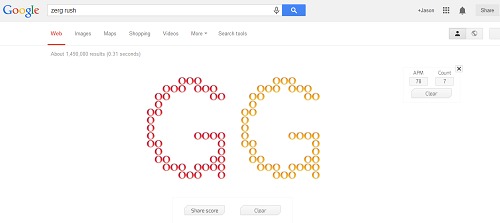Type “Zerg Rush” into Google, and watch what happens.
Go on. Do it. We’ll wait.
…
DO IT.
OK, for those of you who didn’t obey, here’s what happens. A series of red and yellow Os rapidly march up, down, and all around your screen, eating up all your search results. You can use your mouse to destroy them, but good luck taking down more than a few, because they’re fast, come from every conceivable direction, and more show up every second.

“We shall honor our seven fallen soldiers by mocking your failure forever. If we had asses, we would so moon you right now.”
So what IS a “Zerg Rush“? The term came from an old video game called Starcraft, where an alien race called the Zergs attacked enemies in the exact opposite manner of every crappy cinematic ninja clan. While movie ninjas love to attack one at a time, even though that strategy has never even come close to working, Zergs would send dozens, sometimes hundreds of soldiers at a time, completely overwhelming their opponents not by strategy or expertise, but through sheer numbers.
While this approach works in Starcraft (and on Google, apparently), it’s far less impressive in the online content world. And yet, unfortunately, blogs and sites everywhere are getting in on the act. Emphasizing a pure quantity-over-quality approach to content, these sites just bombard their audiences with hundreds of poorly-written, unoriginal, oftentimes-plagiarized articles. Sites like these don’t exist to entertain, inform, or stand out in any way, but simply to generate clicks.
We’re not going to link to any such sites, because that would mean traffic for them and we’re not that nice. But you’ll know them when you see them. They’re the ones that:
–Feature short pieces revolving around viral content you can find on a billion sites already, with MAYBE a tiny bit of commentary to justify the article’s existence (and hopefully avoid a charge of plagiarism.) The meat of such an article’s “creativity” is in its headline, usually a teaser that doesn’t tell you what’s in the article but makes it clear that to NOT click on it would be akin to telling a preschooler that Santa isn’t real.

Oops. Sorry dude. Thought you knew by now.
–Write articles with titles that tell you exactly what the article’s about, except the premise has been done to death countless times before. Without a decent hook of some sort, this type of content cannot possibly be original ever again.
Here’s an example. If, in 2014, you’re planning to post something like “Top 10 Best Guitar Players Ever,” you better have an absurdly interesting hook to make that article’s existence worthwhile. Maybe go the satirical route and list Madonna and Elvis, artists known more for holding a guitar than actually playing it.

“This would be so much easier if chords didn’t exist.”
Hell, stick the WWF’s Honky Tonk Man on there. Go crazy. Have fun. Don’t just write another list telling us that you think Jimi Hendrix was a great guitarist. The 14 million other Best Guitar Player lists out there told us that already.
–Post poorly-written, clearly unedited articles that were rushed to publication simply so the website could have more content. This does nobody any good. Even completely original ideas will die a quick death if typos, broken links, margin-busting pictures, and half-assed formatting litter the page.
Yes, the writer should self-edit prior to submission, but editors should also edit. There’s more to the job than simply adding a picture or two and then scheduling a piece for publication. Unfortunately, Zerg Rush websites would rather just get stuff up there quick as can be, because who cares about style OR substance? What’s truly important when running a website, is that you have stuff. Lots of stuff.
We understand the temptation to just put out endless content, regardless of quality. After all, the Internet is intensely competitive, and hundreds of thousands of new websites pop up every day. If you lay dormant for too long, people are going to forget about you. We get that.

That’s why we hired this guy to ensure the office keyboards keep clacking.
At the same time, if your content is consistently bad, never gets better, and it becomes clear that you care only about quantity, that’s just as bad. Eventually, people will realize your site sucks and move on to better ones that deliver quality, original content, at a brisk yet deliberate pace. A site like that is infinitely superior to any hack site rolling the dice with the Zerg Rush approach.
PHOTO CREDITS: Guillaume Rodier, ideasfijas, staalnaake